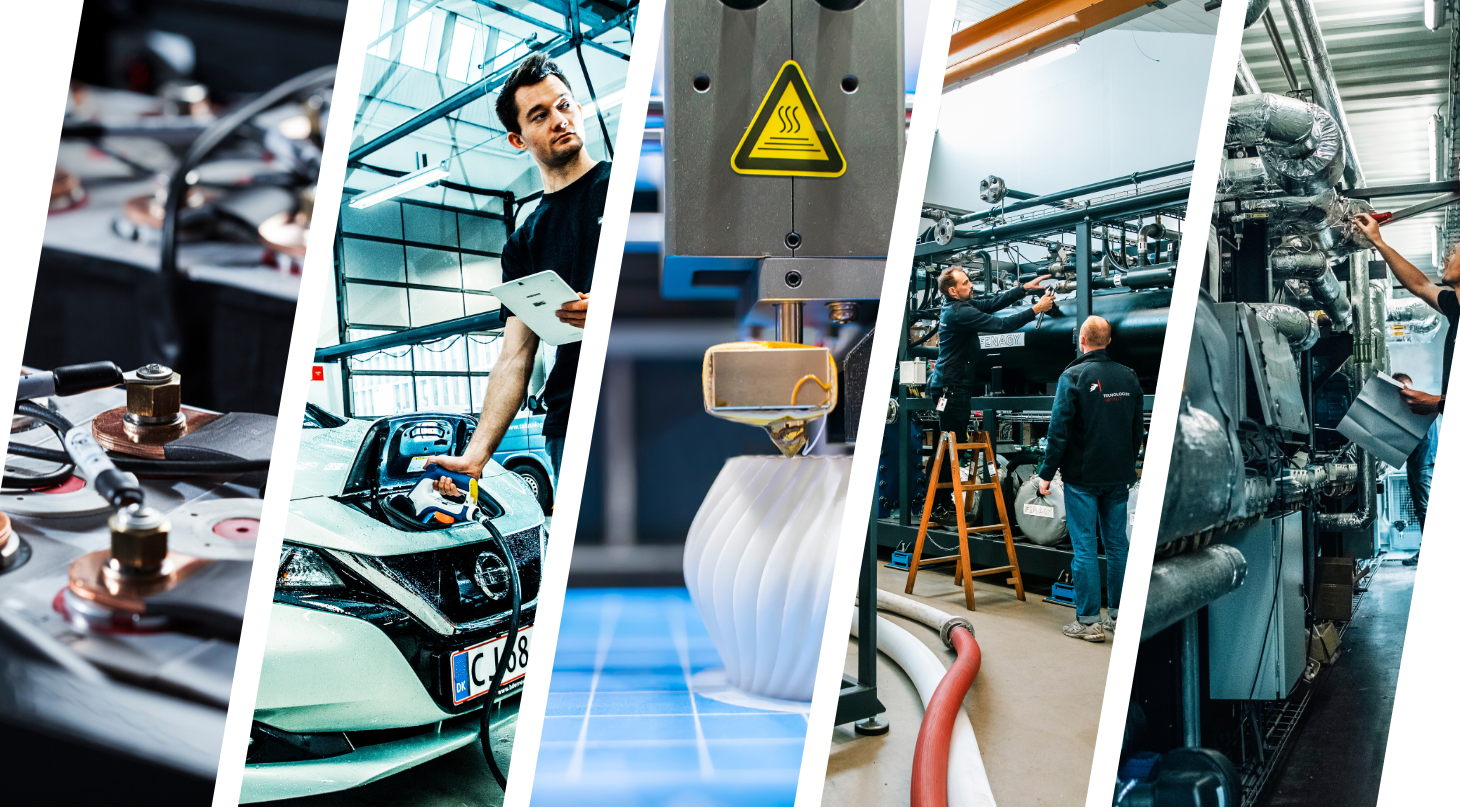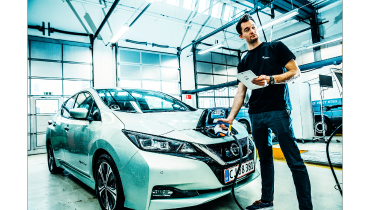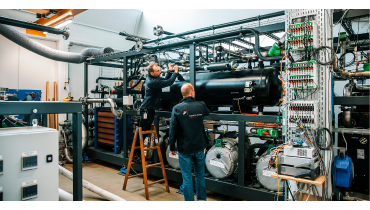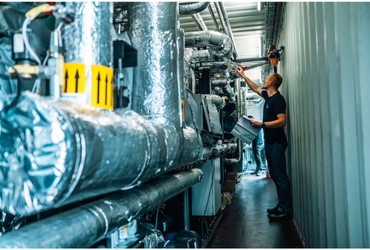
Advanced Energy Storage Conference - Laboratory Tours at the Conference 2025
Select Page
Below you can read about the laboratories you will have the opportunity to experience at the conference 2025
Register for the conference here
As part of this year’s conference, you will have the opportunity to join guided tours of selected laboratories, listed below. Here you can experience first-hand how the facilities are used in practice, hear directly from the experts, and ask questions.
Battery Laboratory
Grid Laboratory
3D Printing Laboratory
Industrial Refrigeration and Heat Pump Laboratory
Two Large High-Temperature Heat Pumps in testing
You can read more about each laboratory below:
Experience the battery technology of tomorrow - step inside the Battery Laboratory!
How can we make batteries last longer, become safer, and deliver even greater power? At the Battery Laboratory, we investigate these questions every day - this is where we test and develop the energy storage solutions of the future.
In our laboratory, batteries are put to the ultimate test: We evaluate both individual cells and complete systems that power everything from electric vehicles to large-scale energy plants. Our state-of-the-art equipment exposes batteries to everything from freezing cold to intense heatwaves, extremely high currents, and realistic everyday scenarios. This enables us to understand precisely how batteries respond under the most demanding conditions.
A particular area of focus is our work with advanced “state” algorithms. We develop intelligent systems that - much like a “health app” for batteries - can inform us about the remaining energy (state of charge), overall battery health (state of health), and available power output (state of power). We are even developing new state of safety algorithms that can alert us to early warning signs of potential issues – such as an increased fire risk – long before they become dangerous.
You will also gain insight into our work with international standards. We conduct tests in accordance with both EN 62619 and SAE J2464, assessing everything from short-circuit protection to ignition temperature measurement. In doing so, we can not only document battery safety; we are also able to classify batteries according to EUCAR Hazard Levels - an important tool in risk assessment and the development of safe new products.
Join us at the Battery Laboratory to discover how we combine advanced technology and research to create the safe, powerful, and sustainable batteries of the future - and get a glimpse of how innovative algorithms are paving the way towards safer, smarter energy solutions!
Grid Laboratory
Grid Laboratory is a flexible, state-of-the-art test laboratory specialising in testing battery energy storage systems (BESS), power electronics such as solar and hybrid inverter, and electric vehicle (EV) technologies. With advanced high powered equipment, the lab offers comprehensive capabilities, including inverter and grid code complianceassessments, and high-power EV charging up to 350 kW.

With a vehicle-sized climate chamber, Grid Lab enables environmental testing under controlled conditions. Our advanced equipment includes a 100 kVA grid simulator capable of emulating a range of grid conditions, such as varying voltage, frequency, and harmonics, as well as a bidirectional DC power supply for simulating batteries or solar power plants.
Mobile power quality analyzers and electricity meters support detailed electrical measurements both in-lab and on-site. Many of our systems are portable, allowing us to provide flexible testing solutions at your location or within our facility.
On the day of the tour, the laboratory will be conducting ongoing tests as part of the Repower project. This offers a unique opportunity to experience the laboratory in full operation and gain insight into the specific measurements and results. The Repower project will also be presented in a dedicated presentation at the conference.
Contact our expert
Lasse Stenhøj Ingvardsen
Team Manager
Renewable Energy Systems
Lasse has several years of experience working with electrical energy storage, including testing electric vehicle batteries, designing and commissioning battery energy storage systems (BESS), and developing digital tools to enhance flexibility in the connection between energy components.
Contact Lasse
3D-print
The 3D printing laboratory develops and produces 3D-printed parts in both metal and plastic. The laboratory is equipped with advanced 3D printing technology and works with materials such as titanium, stainless steel, aluminium, copper, and nylon, several of which are approved for food contact.
The laboratory’s activities range from advanced product design and industrial production to post-processing and quality assurance. In addition, new special materials and surfaces with specific properties are developed here. A few examples are blue nylon powder that can be detected by metal or X-ray scanners, and vapor-smoothed surfaces with improved cleanability - both aimed at the food industry. The laboratory is ISO 9001 certified and maintains full traceability of all 3D-printed parts, and it undertakes assignments for both industry and research projects.
Industrial Refrigeration and Heat Pump Laboratory
The industrial Refrigeration and Heat Pump laboratory is dedicated to large cooling and heat pump systems, equipped with advanced ammonia and transcritical CO2 systems. These facilities are designed to handle a diverse range of large products and components, including a test stand for high-temperature heat pumps capable of reaching up to 180 °C. The laboratory focuses on using future-ready natural refrigerants such as propane, butane, isobutane, isopentane, and water for high-temperature applications. 
The laboratory offers extensive testing capabilities, including Factory Acceptance Tests (FAT), which allow for thorough evaluation of systems and components before market release. These tests provide critical insights into energy consumption, efficiency, and performance, highlighting optimization opportunities and potential energy savings. The Plug’n’test concept implemented in the facilities significantly reduces preparation time, enabling faster testing and quicker delivery to endusers.
The laboratory plays a crucial role in research and development, supporting the testing and advancement of new technologies.
With a strong emphasis on natural refrigerants, the lab team guides you through the transitions to environmentally friendly options like R290 and R744.
Contact our expert
Lasse Søe
Team Manager
Refrigeration and Heat Pump Technology
Lasse works as a laboratory manager in the Industrial Refrigeration and Heat Pump Laboratory and has many years of experience in refrigeration and heat pump technology, energy storage, and laboratory testing.
Contact Lasse
Two large HTHPs for test
As part of the high-temperature heat pump facilities, the InterHeat and SuPrHeat projects have each installed a high-temperature heat pump in a container. Each container with the heat pump will be transported to the end user, where it will be integrated into production processes, when each project has been completed. The SuPrHeat project focuses on developing and demonstrating three high-temperature heat pump technologies, each using natural refrigerants (steam, hydrocarbons, or CO₂). With supply temperatures of up to 200 °C and capacities of 500 kW, these systems aim to electrify industrial process heating while reducing energy use and greenhouse gas emissions. The project involves component and system innovation, extensive testing, and integration with end-users, supporting the Danish process industry’s compliance with climate goals.
The SuPrHeat project focuses on developing and demonstrating three high-temperature heat pump technologies, each using natural refrigerants (steam, hydrocarbons, or CO₂). With supply temperatures of up to 200 °C and capacities of 500 kW, these systems aim to electrify industrial process heating while reducing energy use and greenhouse gas emissions. The project involves component and system innovation, extensive testing, and integration with end-users, supporting the Danish process industry’s compliance with climate goals.
The InterHeat project advances high-temperature heat pump technologies for broad industrial use, with particular focus on process and sector integration. Two different heat pump systems are developed, tested in state-of-the-art lab facilities, and demonstrated in real applications – one designed for a protein drying process and one for process heating to a carbon capture process. The project also emphasizes cross-sector knowledge sharing and stakeholder awareness to accelerate the adoption of emission-free process heating.